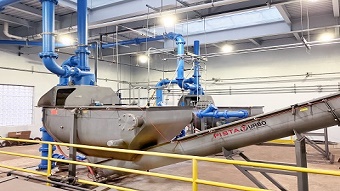Initiative proposes turning old wind tubine blades into composite for cement
Marie Donlon | July 18, 2019 A recently announced initiative in the U.K. will attempt to devise a plan for recycling soon-to-be decommissioned wind turbines, using the glass fiber composite of the turbine blades as material in cement.
A recently announced initiative in the U.K. will attempt to devise a plan for recycling soon-to-be decommissioned wind turbines, using the glass fiber composite of the turbine blades as material in cement.
The initiative — which includes European wind and chemical industry partners WindEurope (Brussels, Belgium), the European Chemical Industry Council (CEFIC, Brussels, Belgium) and the European Composites Industry Association (EuCIA, Brussels, Belgium) — proposes to recycle decommissioned wind turbine blades by grinding the glass fiber composite blades for use in the manufacture of cement. Doing so, the team believes, will reuse raw materials, recover energy and reduce CO2 emissions.
With an estimated 2.5 million tons of composite material currently used in the EU energy sector as well as roughly 130,000 active wind turbines, an estimated 12,000 first-generation wind turbines are nearing the end of their operational lives and will eventually be replaced by modern wind turbines, leaving behind large decommissioned components. As such, the team proposes grinding decommissioned wind turbine blades with portable grinding equipment and using the glass fibers from the composite material as filler to replace cement raw materials like silica. Such a move, according to experts, could potentially cut carbon dioxide output of the cement manufacturing process by as much as 16%.
For now, the process only works for glass-reinforced composites. However, the team is also exploring alternative technologies like mechanical recycling and pyrolysis, which is thermal decomposition of materials at high temperatures in an inert atmosphere, for handling wind turbines at the end of their lives.
“As a global supplier to wind blade and nacelle producers, we hope to set an industry standard where learnings from wind turbine recycling will then be transferred to other markets to enhance the overall sustainability of composites,” said Stefan Osterwind, vice president of Europe, the Middle East, Africa and India (EMEA & India) for Ashland and chairman of the CEFIC UPR sector group.





If this were profitable, someone would be doing it. Why do we the government involved?